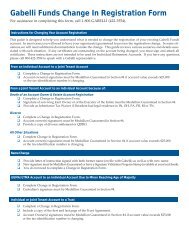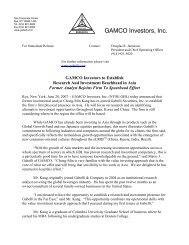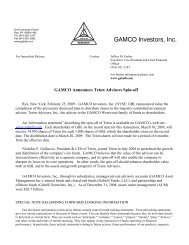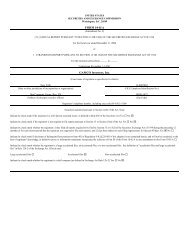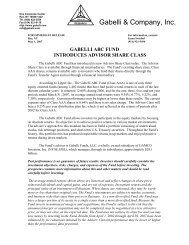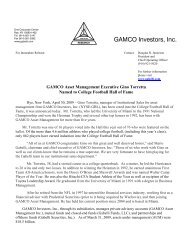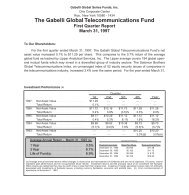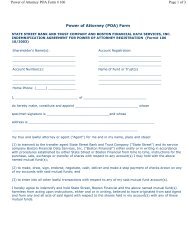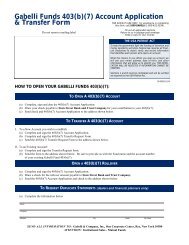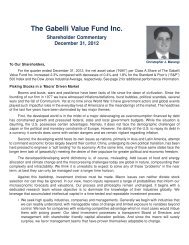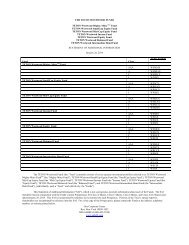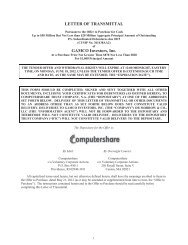Original GBL Prospectus - Gabelli
Original GBL Prospectus - Gabelli
Original GBL Prospectus - Gabelli
You also want an ePaper? Increase the reach of your titles
YUMPU automatically turns print PDFs into web optimized ePapers that Google loves.
Future Investment Performance Could Reduce Revenues and Other Income<br />
Success in the investment management and mutual fund businesses is dependent on investment<br />
performance as well as distribution and client servicing. Good performance generally stimulates sales of the<br />
Company's investment products and tends to keep withdrawals and redemptions low, which generates higher<br />
management fees (which are based on the amount of assets under management). Conversely, relatively poor<br />
performance tends to result in decreased sales, increased withdrawals and redemptions in the case of the openend<br />
Mutual Funds, and in the loss of Separate Accounts, with corresponding decreases in revenues to the<br />
Company. Many analysts of the mutual fund industry believe that investment performance is the most<br />
important factor for the growth of no-load Mutual Funds, such as those oÅered by the Company. Failure of<br />
the Company's investment products to perform well could, therefore, have a material adverse eÅect on the<br />
Company.<br />
Loss of SigniÑcant Separate Accounts Could AÅect Revenues<br />
The Company had approximately 950 Separate Accounts as of September 30, 1998, of which the ten<br />
largest accounts generated approximately 7% of the Company's total revenues during the nine months ended<br />
September 30, 1998. Loss of these accounts for any reason would have an adverse eÅect on the Company's<br />
revenues. Notwithstanding good performance, the Company has from time to time lost large Separate<br />
Accounts as a result of corporate mergers and restructurings, and the Company could continue to lose<br />
accounts under these or other circumstances.<br />
Compliance Failures and Changes in Regulation Could Adversely AÅect the Company<br />
The Company's investment management activities are subject to client guidelines and its Mutual Fund<br />
business involves compliance with numerous investment, asset valuation, distribution and tax requirements. A<br />
failure to adhere to these guidelines or satisfy these requirements could result in losses which could be<br />
recovered by the client from the Company in certain circumstances. Although the Company has installed<br />
procedures and utilizes the services of experienced administrators, accountants and lawyers to assist it in<br />
adhering to these guidelines and satisfying these requirements, and maintains insurance to protect it in the<br />
case of client losses, there can be no assurance that such precautions or insurance will protect the Company<br />
from potential liabilities.<br />
The Company's businesses are subject to extensive regulation in the United States, including by the<br />
Securities and Exchange Commission (the ""Commission'') and the NASD. The Company is also subject to<br />
the laws of non-U.S. jurisdictions and non-U.S. regulatory agencies or bodies. The failure of the Company to<br />
comply with applicable laws or regulations could result in Ñnes, suspensions of personnel or other sanctions,<br />
including revocation of the registration of the Company or any of its subsidiaries as an investment adviser or<br />
broker-dealer. Changes in laws or regulations or in governmental policies could have a material adverse eÅect<br />
on the Company. See ""Business Ì Regulation.''<br />
The Company's Sources of Revenue are Subject to Termination on Short Notice<br />
Substantially all of the Company's revenues are derived from investment management agreements and<br />
distribution arrangements. Investment management agreements and distribution arrangements with the<br />
Mutual Funds are terminable without penalty on 60 days' notice (subject to certain additional procedural<br />
requirements in the case of termination by a Mutual Fund) and must be speciÑcally approved at least<br />
annually, as required by law. Such annual renewal requires, among other things, approval by the disinterested<br />
members of each Mutual Fund's board of directors or trustees. See ""Business Ì Brokerage and Mutual Fund<br />
Distribution.'' Investment advisory agreements with the Separate Accounts are typically terminable by the<br />
client without penalty on 30 days' notice or less. Any failure to renew or termination of a signiÑcant number of<br />
these agreements or arrangements would have a material adverse eÅect on the Company.<br />
14




